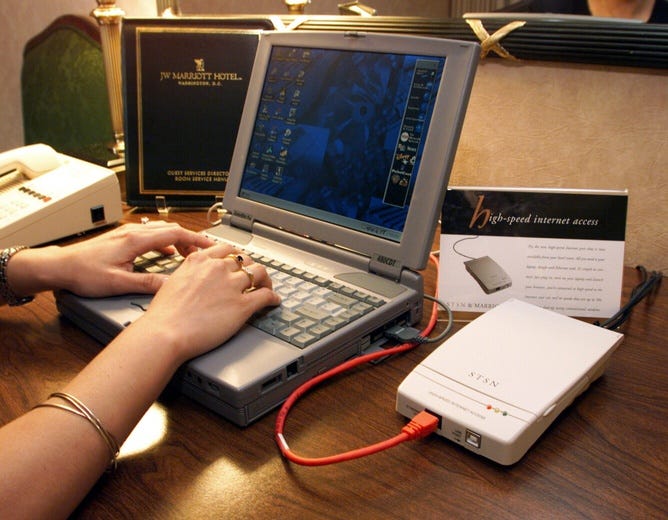
The internet as we know it turned 30 years old on Sunday.
On April 30th, 1993, the "World Wide Web" was released into the public domain, allowing computers to connect in ways never possible before.
Concepts like a "website" and "internet browser" were born out of that day - along with the ability to add pictures and sound to what had previously been a text-only format.
The early days of the internet are a fry cry from that which we know today. The telltale tones of a dial-up connection are probably engrained in your brain, next to telephone busy signals and the whir of a VCR rewinding.
We've come to rely on the internet for so much, it's hard to imagine what life would be like without it -- though we've all likely experienced a wi-fi outage that left us unable to stream our favorite TV shows, attend work meetings and classes, look up recipes, read the news, or even order groceries.
In today's world, the internet is directly connected to countless facets of our day-to-day activities. According to Oberlo, two-thirds of the world's population uses the internet, with the average person spending over 6.5 hours a day online.
Our lives have changed dramatically since the internet emerged 30 years ago. Zaryn Dentzel, CEO of Spain-based tech company Tuenti, wrote in an essay point-blankly that the internet has "turned our existence upside down," revolutionizing communications and globalizing a society connected by new technologies.
"People no longer spend hours gazing at a computer screen after work or class," Dentzel said. "Instead, they use their mobile devices to stay online everywhere, all the time."
The internet revolution is not just technological, either, Dentzel pointed out.
"It also operates at a personal level, and throughout the structure of society," he said. "The internet makes it possible for an unlimited number of people to communicate with one another freely and easily, in an unrestricted way."
According to Neosperience, here are 10 ways the internet has changed the way we live and do business.
1. Research
When you have a question, where's the first place you turn? You probably "Google it." As Neosperience points out, "the internet has become the primary source of information, and search engines the main door to access it."
2. Communication
Phone calls and letters have been replaced by texting, video chats and social media -- not to mention chat rooms that allow us to connect with strangers around the world.
3. Shopping
You essentially never have to leave your home to shop ever again. Thanks to websites like Amazon and nearly every physical store having an online order and delivery system, an endless supply of goods can be brought to your doorstep with the click of a button.
4. Travels
Not only can you see the world from the comfort of your couch, but everyone can be their own personal travel agent. Planning a vacation has never been easier, with everything you need to book right at your fingertips. Not to mention, you can learn everything about your destination before you even arrive.
5. Entertainment
Streaming movies and TV has taken the world by storm with people cutting the proverbial cord to traditional cable service every day. On top of that, smart televisions and gaming consoles have opened the door to even more on-demand content. There's also no longer a need to have a CD collection with more music than you can imagine just waiting to be streamed on your devices.
6. Financial Services
Remember balancing a check book -- or even using checks in general? The internet made both obsolete with mobile paying options and banking websites that track every financial move and card swipe you make so you know exactly how much money you have in your account. You can even apply for loans and credit cards without even stepping foot into a banking center, and check your credit store in a matter of seconds.
7. Relationships
The old fashioned way of meeting someone out in the "real world" is almost unheard of anymore, with countless dating apps waiting to connect you to your potential next true love. There's even a plethora of apps for people who are only looking for a casual fling instead of long-term commitment.
8. Healthcare
The internet has turned everyone into a doctor, diagnosing potential ailments based on vague symptoms. For better or worse, you really can get healthcare advice online if you know how to look out for misleading information. The COVID-19 pandemic also brought telehealth visits to the forefront of the industry, allowing us to speak to physicians and even get prescriptions without stepping foot into a doctor's office.
9. Marketing
The world of advertising now has a direct line to consumers through the internet. Marketing techniques can be custom tailored in a way to engage customers with personalized content from your company that you know they'll care about by directly targeting specific consumers.
10. Employment
Your physical presence in an office is no longer required with the opportunity of remote working. Not only that, but you can search for employment without having to go door-to-door, and companies can literally complete the hiring process from application to onboarding completely online.


